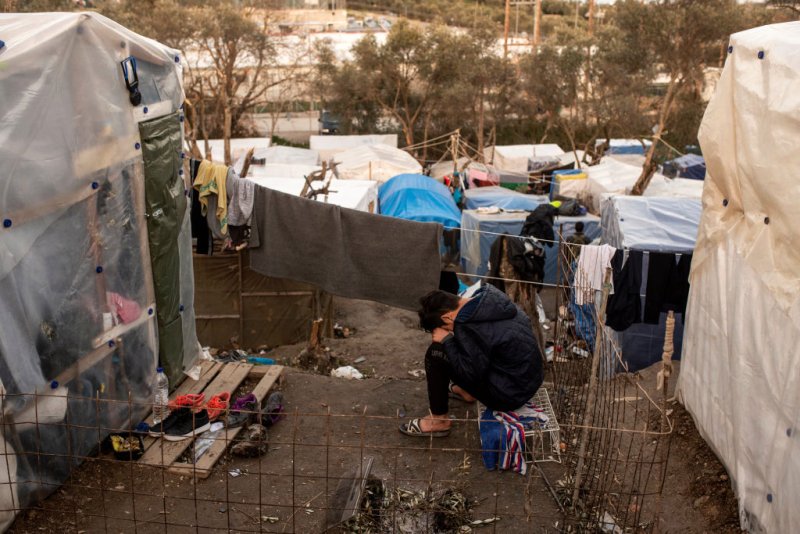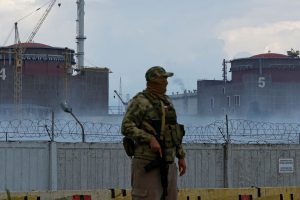THE SITUATION OF THE ASYLUM SEEKERS IN CAMP MORIA IN RELATION WITH THE EFFECTİVENESS OF THE COMMON EUROPEAN ASYLUM SYSTEM

Görsel: Ivan Romano-Getty Images
Introduction
In 2015 the European Union (EU) has faced a migration crisis with thousands of asylum seekers arriving on its borders. Since 1999, the EU has been working on a Common European Asylum System (CEAS), aimed at establishing minimum standards for the treatment of asylum applications and the handling of asylum seekers. With the influx of refugees towards Europe, the Union has been put on the test of how more solidly it can act. Following with the high numbers of asylum applications at the EU’s external borders, it became clear that existing minimum standards in the area of asylum law were not sufficient to deal with the crisis. There was also a lack of solidarity among Member States to participate in resettlement and distribution programs. Especially in the camp Moria on the Greek island Lesvos, several conditions have led to infringements of human rights and European principles. After the EU-Turkey Declaration of 18th March 2016 and the Dublin III Regulation the situation has become worse. With the outbreak of the Covid-19 Pandemic, discussions have been initiated again on the effectiveness of the European Asylum Policy. This article first introduces the main legal bases of the rights of asylum seekers. It than explains the essential procedures and legislation which have created the situation on the islands and finally lists the human rights and European law infringements that happens until today in Moria.
The Common European Asylum System
The EU as a supranational organization has developed a ‘’Common European Asylum System’’. The regulations established on the ground of this system are initially based on the Geneva Convention on Refugees (GCR) and the Protocol relating to the Status of Refugees with reference to the European Convention of Human Rights (ECHR). Furthermore, according to Article 67 of the Treaty on the Functioning of the European Union (TFEU), the EU provides ‘’an area of freedom, security and justice’’. On this basis, the second paragraph of the relevant article perceives the work in the field of asylum, immigration and controls at the external borders as a common task of the Union and refers to the solidarity of the Member States in dealing with this task.
In order to create this task a summit meeting was held in Tampere in 1999. There, the heads of states and governments of Europe pledged to respect the GCR and the Human Rights declarations as minimum standards for further regulations in the areas of asylum and refugee policy. Since then, new programs have been opened in 5-year cycles to create and develop regulations concerning the protection and treatment of refugees, which are standards to which member states must adhere[i]. Today the main regulations with the minimum standards within the scope of the CEAS are the Qualification Directive, the Procedural Directive, the Reception Directive and the Dublin III Regulation.
The EU Migration Crisis
Because of the lasting war in the middle east and the increasing attacks in Syria in 2015 around 1,2 million asylum seekers were registered in Europe. Besides the war, the reason for the mass influx of asylum seekers was the congestion in the neighboring countries of Syria. This led refugees perceiving the flight to Europe as a solution for a better quality of life and care[ii]. After their arrival in Europe, hard living conditions awaited the refugees, because according to the Dublin III Regulation Article 7[iii] the state responsible for receiving the asylum seekers is the one in which the applicants first entered in. In this case, it was the EU Members Greece and Italy, which were the first entry and first application countries. However, the number of arrivals was so high that the refugees could not be cared for in the reception centers and had to wait for days in deplorable conditions until they were registered[iv].
As a means to support frontline Member States that were faced with several problems due to the arrival of thousands of migrants, in April 2015 the European Agenda of Migration was established by the European Commission[v]. In this agenda the ‘hotspot approach’ was introduced. This was a key element for the supports of the EU on the external borders of the Union. In these hotspots experts from EU agencies like the European Asylum Support Office (EASO), Europol, the European Border and Coast Guard Agency (FRONTEX) and Eurojust support with their works the duties of the national authorities with their works, which includes the application, rejection and relocation processes. In Greece there are currently 5 hotspots. One of these hotspots is Lesvos with a total reception capacity of 3000 people.
The Migration Agenda also has contained relocation mechanisms. The aim was to relocate asylum-seekers from Italy and Greece to other EU Member States as a means of relieving the pressure from the frontline states and sharing solidarity according to the EU Charter as well as for sharing responsibility for the asylum-seekers[vi]. Unfortunately, EU Members like Poland, Hungary, the Czech Republic, Slovakia and Austria, did not want to take in migrants at all, but were mostly prepared to show “flexible solidarity”[vii]. As there have always been disputes between EU members over the redistribution quota, a cooperation with Turkey in order to manage the refugee crisis seemed like a solution[viii]. According to the Deal all irregular migrants arriving in the Greek islands from Turkey will be returned and for every Syrian who has been repatriated from the Greek islands to Turkey another Syrian from Turkey will be resettled in the EU[ix].
To realize these commitments the hotspots, especially those in Greece were used as a detention center for the repatriation of the rejected asylum seekers to Turkey. Moria, one of these hotspots has been one of the most controversial refugee camps among the activists and in the media. The reasons for that were the overcrowding of asylum seekers, insufficient supply and adhesive-like conditions caused by slow procedures, which have become worse since the Covid-19 Pandemic.
Infringement of Human Rights and European Principles
Due to the respective Deal asylum seekers who arrive on the Greek islands have only two choices. They either return to their country of origin or they have to apply for international protection at the hotspots. According to the Asylum Procedure Directive Nr. 2013/32/EU Article 33 is an application ‘’inadmissible if a country which is not a Member State is considered as a safe third country for the applicant, pursuant to Article 38’’. Concerning the asylum seekers on the Greek islands Turkey is accepted as a safe third country on account of the Deal. Regarding Article 38 it is questionable considering Turkey as a safe third country; paragraph (e) concerns that in a safe third country ‘’ the possibility exists to request refugee status and, if found to be a refugee, to receive protection in accordance with the Geneva Convention’’. Turkey signed the Refugee Convention with a geographical reservation, which means that people who do not come from Europe cannot be granted refugee status[x]. Also, in the past there have been proceedings before the European Court of Human Rights (ECtHR) against Turkey for the violation of Art.3 ECHR because of ‘’inhuman or degrading treatment’’, such as in the MB v. Turkey[xi], Keshmiri v. Turkey[xii] or Charahili v. Turkey[xiii] cases.
Moreover, applicants who arrive from Turkey are hold without further procedure in the camps. These are, at the same time, considered to be reception, identification and detention centers for asylum seekers who are waiting for months to apply for international protection, the progress of the asylum procedure or for the repatriations to Turkey[xiv]. Especially in Camp Moria , which has a capacity of 3000 people, 18.000 people were waiting for their applications to be processed. In Moria, the asylum seekers lived in extreme overcrowding conditions. They had a lack of basic sanitary, social protection, personal security and health care. Only few non-governmental health care providers were serving at the camp with service shortages.
Even after the CoviD-19 Pandemic broke out in 2020 13.000 asylum seekers still have stayed at the camp. In March 2020 the entire camp was placed in quarantine and first cases of the virus could be registered in September 2020. Right afterwards on 8th September the camp was burned down due to a fire outbreak. Subsequently, thousands of migrants were moved to a new camp. In this camp called ‘’Karatepe’’ at present just 37 sanitation facilities are available. There is inadequate drinking water and the tents in which the asylum seekers are sleeping are erected. In October, heavy rain led to severe flooding. Children have to wade in dirty water so that new health conditions have aroused[xv]. These conditions constitute an infringement of the rights concerning Article 3 of the ECHR and Article 4 ECFR because of ‘’inhuman and degrading treatment’’ and Article 1 ECFR because of ‘’human dignity’’. On 16th April the ECtHR has decided that the accommodation on the islands shall be provided in the light of Article 3 ECHR and medical treatment shall be ensured in accordance with the physical and medical needs of the applicants[xvi].
The main reason for these conditions is the disproportionately long duration of the asylum procedures. According to the Asylum Procedure Directive Nr. 2013/32/EU Article 31 ‘’Member States shall ensure that the examination procedure is concluded within six months of the lodging of the application’’. In practice, unfortunately just for the interviews asylum seekers have to wait for months. Catherine Woollard, director of the European Council on Refugees and Exiles in Brussels, notes that there were already cases of Afghans and Iraqis in 2019 who had been given an appointment at the end of 2023 for the first interview. Reasons for these delays could be structural problems and deficiency of resources in the Greek asylum system. Also, there is a lack of compliance with the European minimum standards of procedures and reception conditions[xvii]. Besides the long procedures on the island, another serious infringement is the deportation and detention of those whose application has been rejected and who have to wait for their repatriation. In these centers they have to stay for months. The infringed right of ‘’effective legal protection before repatriation’’ that is regulated in the Asylum Procedure Directive Nr. 2013/32/EU Article 46 together with Art.47 of the ECFR and Article 13 of the ECHR must be ensured[xviii].
Last but not least emphasis should be given to the lack of solidarity and the rule of law of the EU as a supranational organization with the aim of creating ‘’an area of freedom, security and justice’’. In Article 67 para. 2 of the TFEU, solidarity is regulated as one of the guiding principles of the EU migration policy. Another important principle which is the rule of law, is regulated in Article 2 of the Treaty of the European Union[xix]. With the Migration Crisis since 2015, the Union has been confronted with the weaknesses of the CEAS[xx]. Unfortunately, there is a lack of political will and an absence of common political vision among the Member States. Greece as a country with several economic problems is carrying overwhelming responsibility due to the Dublin III Regulation as the first state of entry for asylum seekers. While doing so, with regard to the new decisions in the asylum policy, it provides a place for the asylum seekers, in which several human rights and European principles are being violated.
On the other side, other Member States are ignoring these violations, for example by closing their borders to prevent asylum seekers reaching other European countries. Instead of showing responsibility and solidarity an externalization strategy is being pursued to keep the people out of Europe. While Greece and Italy as first states of entry and Turkey, Libya, Lebanon, Jordan and North Africa as neighboring and transit countries deal with the refugees, the EU tries to hide behind financial and personnel aids. Member States such as Hungary, Poland, Serbia etc. are determining the asylum policy with their tough stance. In 2016 the EU Commission had proposed reforms of the Dublin Regulation and asylum procedures. However, since it has contained a mandatory relocation mechanism, the eastern and northern EU members have rejected this proposal[xxi]. On 2nd April 2020 the European Court of Justice has decided in the case against the Republic of Poland, Hungary and the Czech Republic that they have violated EU law by refusing to accept asylum seekers from Greece and Italy[xxii]. Until today no progress could be made concerning the distribution mechanism of asylum seekers throughout Europe.
Conclusion
Despite of the aim of establishing CEAS, the EU could not develop a long-term strategy in the migration policy. It tried to control the situation with a political declaration with Turkey, which itself has also created legal hurdles. Brutality, xenophobia and securitization of the borders only contributed to more suffering on the island. The EU cannot simply evade the responsibility over refugees by leaving the countries at the external borders to implement a failed asylum policy on their own. For improving the conditions of the asylum seekers on the islands and for providing a fair procedure to these people who already suffer from difficult psychological problems and trauma, the EU must start to relocate the asylum seekers. The overcrowding on the island and the human rights violations are mainly results of the EU and Member State’s policies and practices. A solution is possible through the renewal of existing directives and regulations which currently are not capable of resolving the crisis where the Member States have to deal with a large number of asylum seekers. Especially, the Dublin III Regulation has to be renewed with an alternative to the rule of first state of entry. Concerning unwilling Member States by establishing new rules, the EU should impose strict sanctions to those states that do not want to comply with the rules. It is worth mentioning, that the Covid-19 pandemic and the fire breakout in Moria has aggravated the situation of the asylum seekers. It is clear that these events will not be the last, that is why the EU has to act immediately.
BIBLIOGRAPHY
[i] Haase, Marianne/Jugl, Jan C.:Asyl und Flüchtlingspolitik der EU (Asylum Policy of the EU), https://www.bpb.de/gesellschaft/migration/dossier-migration-ALT/56551/asyl-fluechtlingspolitik?p=all (last access 06.01.2021)
[ii] https://www.tagesschau.de/ausland/legale-fluchtwege-101.html (last accessed 08.01.2021)
[iii] ‘’The Member State (…) shall be determined on the basis of the situation obtaining when the applicant first lodged his or her application for international protection with a Member State.’’
[iv] https://www.proasyl.de/thema/eu-asylpolitik/ (last access 08.09.2021)
[v]https://ec.europa.eu/home-affairs/sites/homeaffairs/files/what-we-do/policies/european-agenda-migration/background-information/docs/communication_on_the_european_agenda_on_migration_en.pdf (last access 09.01.2021)
[vi] https://www.europarl.europa.eu/RegData/etudes/BRIE/2018/623563/EPRS_BRI(2018)623563_EN.pdf (last access 09.01.2021)
[vii] https://www.dw.com/de/eu-macht-bei-migration-keine-fortschritte/a-55938815 (last access 09.01.2021)
[viii] https://www.adenauercampus.de/themen/integration/zeitmaschine-fluechtlingskrise (last access 09.01.2021)
[ix] https://www.consilium.europa.eu/en/press/press-releases/2016/03/18/eu-turkey-statement/ (last access 09.01.2021)
[x] https://www.amnesty.de/2016/4/1/tuerkei-schiebt-massenhaft-syrische-fluechtlinge-ab (last access 20.01.2021)
[xi] https://www.refworld.org/cases,ECHR,4c17a13f2.html (last access 20.01.2021)
[xii] https://www.refworld.org/cases,ECHR,4bc5cfcb2.html (last access 20.01.2021)
[xiii] https://www.refworld.org/cases,ECHR,4bc5cec12.html (last access 20.01.2021)
[xiv] Statement ProAsyl: Against Detention and Deprivation of Rights of People Seeking Protection 22.January 2020 https://www.proasyl.de/wp-content/uploads/PRO-ASYL_Gegen-Haft-und-Entrechtung_Stellungnahme-GEAS_2020_1.pdf (last access 20.01.2021)
[xv] Digidiki, Vasileia; Bhabha, Jacqueline: Perspective EU Migration Pact Fails to Address Human Rights Concerns in Lesvos, Greece; Health and Human Rights Journal Volume 22/2 December 2020, pp.291-296 https://www.hhrjournal.org/2020/12/perspective-eu-migration-pact-fails-to-address-human-rights-concerns-in-lesvos-greece/ (last access 20.01.2021)
[xvi] https://www.proasyl.de/pressemitteilung/menschenrechtsgerichtshof-zwingt-griechenland-fluechtlinge-aus-dem-hotspot-moria-menschenwuerdig-unterzubringen-und-medizinische-behandlung-sicherzustellen/ (last access 20.01.2021)
[xvii] https://www.dw.com/de/warum-sind-asylverfahren-in-griechenland-so-langsam/a-55042490 (last access 20.01.2021)
[xviii] Statement ProAsyl: Against Detention and Deprivation of Rights of People Seeking Protection 22.January 2020 https://www.proasyl.de/wp-content/uploads/PRO-ASYL_Gegen-Haft-und-Entrechtung_Stellungnahme-GEAS_2020_1.pdf (last access 20.01.2021)
[xix] ‘’The Union is founded on the values of respect for human dignity, freedom, democracy, equality, the rule of law and respect for human rights, including the rights of persons belonging to minorities. (…)’’.
[xx] Bast, Jürgen: Solidarität im europäischen Einwanderungs- und Asylrecht (Solidarity in European Immigration and Asylum Law), March 2014
[xxi] https://www.dw.com/de/eu-asylpolitik-abschotten-oder-aufnehmen/a-54785742 (last access 21.01.2021)
[xxii]http://curia.europa.eu/juris/document/document.jsf;jsessionid=3D687E01C94EFD8018808488291A3874?text=&docid=224882&pageIndex=0&doclang=EN&mode=req&dir=&occ=first&part=1&cid=855127 (last access 21.02.2021)



